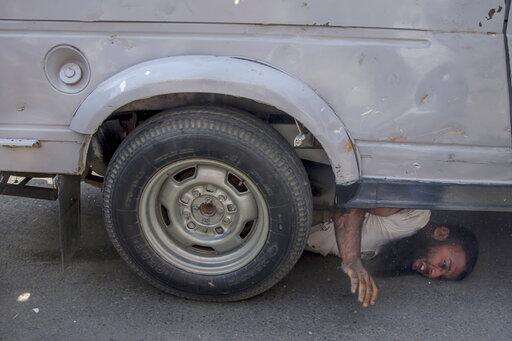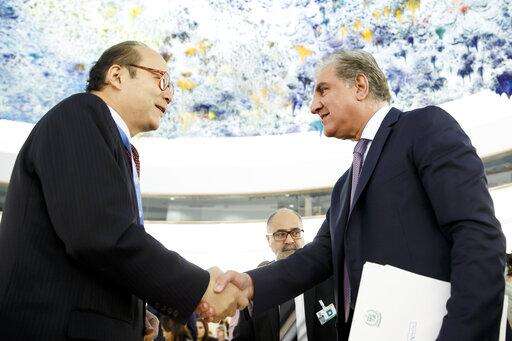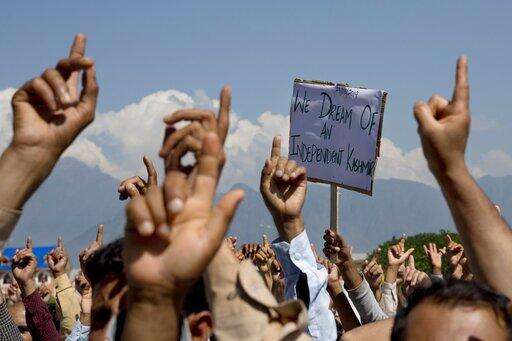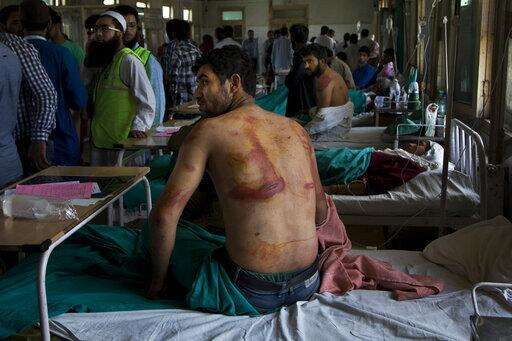Pakistan's Foreign Minister Shah Mehmood Qureshi leaves after a statement during the 42nd session of the Human Rights Council at the European headquarters of the United Nations in Geneva, Switzerland, Tuesday, Sept. 10, 2019. (Salvatore Di Nolfi/Keystone via AP)
The Associated Press
GENEVA (AP) - Pakistan's foreign minister warned Tuesday that India's "illegal occupation" of Muslim-majority Kashmir could drive the nuclear-armed countries "into an accidental war."
Pakistani Foreign Minister Shah Mahmood Qureshi accused India at a session of the U.N.-backed Human Rights Council of turning Kashmir "into the largest prison on this planet." He alleged some Kashmiris were tortured and raped in the region claimed by both Pakistan and India.
"I shudder to mention the word 'genocide' here, but I must," Qureshi said.
Tensions between Pakistan and its southeastern neighbor have been heightened since Aug. 5, when India's government changed the status of Indian-administered Kashmir.
The Indian government imposed a security lockdown and communications blackout that has since been partially lifted in most of Jammu and Kashmir, which India's Parliament voted last month to downgrade from a state into two federally administered territories.
"Once the curfew is lifted, the reality comes out, the world will wake up to the catastrophe that is underway right now," Qureshi told reporters.
Pakistan also issued a statement on behalf of about 60 nations calling for respect of human rights, an end to the curfew and communications shutdown in Kashmir and "unhindered access" for international media and human rights groups in Kashmir.
India's envoy, Foreign Affairs Vice Minister Vijay Thakur Singh, later lashed out against "one delegation" at the Human Rights Council for giving "a running commentary with offensive rhetoric, of false allegations and concocted charges against my country."
She did not mention Pakistan by name.
"The world is aware that this fabricated narrative comes from the epicenter of global terrorism, where ringleaders are sheltered for years," she said, alluding to Pakistan.
"This country conducts cross-border terrorism as a form of alternate diplomacy," she added, without addressing Qureshi's allegations specifically.
Kashmir is divided between India and Pakistan and both claim rights to all of it. The nuclear-armed rivals have fought two wars over the region's control.
Pakistan alleges that India could attack the Pakistan-administered portion of Kashmir by stage-managing an attack in the India-controlled part to divert international attention from human rights violations.
"India is acting irresponsibly. They're being belligerent," Qureshi said. "And if there is a false-flag operation, which we fear, and they use it as a pretext and carry out some misadventure against Pakistan, we will respond."
"We will respond with force," he added. "And, you never know, we could be into an accidental war."
He noted that U.S. President Trump had offered to mediate.
"We welcomed it," Qureshi said. "And India said, 'No, no, no, no. Don't worry, we're going to resolve things on our own.' They cannot be resolved. That cannot be resolved bilaterally."
___
This article corrects a previous version that misidentified the gender of Ms. Vijay Thakur Singh.
Pakistan's Foreign Minister Shah Mehmood Qureshi makes a statement during the 42nd session of the Human Rights Council at the European headquarters of the United Nations in Geneva, Switzerland, Tuesday, Sept. 10, 2019. (Salvatore Di Nolfi/Keystone via AP)
The Associated Press

FILE - In this Wednesday, Aug. 14, 2019 file photo, an Indian paramilitary soldier patrols during security lockdown in Srinagar, Indian controlled Kashmir. Frustration, anger and fear have been growing in Kashmir in the five weeks since the Hindu nationalist government of Prime Minister Narendra Modi stripped the region of most of its semiautonomous status on Aug. 5 and imposed a curfew and a communications blackout. Although some restrictions have been eased in the main city of Srinagar, with students encouraged to return to school and businesses to reopen, rural residents complain of what they perceive as a campaign of violence and intimidation that seems designed at suppressing any militancy, rebellion or dissent. (AP Photo/ Dar Yasin, File)
The Associated Press

FILE - In this Friday, June 1, 2018, file photo, a Kashmiri man shouts for help as a paramilitary vehicle runs over him during a protest in Srinagar, Indian controlled Kashmir. The region is one of the most heavily militarized in the world, patrolled by soldiers and paramilitary police. Most Kashmiris resent the Indian troop presence and support the rebels. For years, there have been accusations from Kashmir residents and international human rights groups that Indian troops have carried out systematic abuse and unjustified arrests of those who oppose rule from New Delhi in the divided region that is claimed by both India and Pakistan. (AP Photo/Dar Yasin)
The Associated Press

Pakistan's Foreign Minister Shah Mehmood Qureshi, right, shakes hands with China's Ambassador Chen Xu, left, after delivering his statement during the 42nd session of the Human Rights Council at the European headquarters of the United Nations in Geneva, Switzerland, Tuesday, Sept. 10, 2019. (Salvatore Di Nolfi/Keystone via AP)
The Associated Press
Pakistan's Foreign Minister Shah Mehmood Qureshi, center, arrives for a statement during the 42nd session of the Human Rights Council at the European headquarters of the United Nations in Geneva, Switzerland, Tuesday, Sept. 10, 2019. (Salvatore Di Nolfi/Keystone via AP)
The Associated Press

FILE - In this Friday, Aug. 23, 2019, file photo, Kashmiri men shout freedom slogans during a protest against New Delhi's tightened grip on the disputed region, after Friday prayers on the outskirts of Srinagar, Indian controlled Kashmir. Frustration, anger and fear have been growing in Kashmir in the five weeks since the Hindu nationalist government of Prime Minister Narendra Modi stripped the region of most of its semiautonomous status on Aug. 5 and imposed a curfew and a communications blackout. Although some restrictions have been eased in the main city of Srinagar, with students encouraged to return to school and businesses to reopen, rural residents complain of what they perceive as a campaign of violence and intimidation that seems designed at suppressing any militancy, rebellion or dissent. (AP Photo/ Dar Yasin, File)
The Associated Press

FILE - In this Aug. 18, 2016 file photo, Sameer Ahmed, a Kashmiri man allegedly beaten up by Indian soldiers at Khrew village, recovers at a local hospital in Srinagar, Indian controlled Kashmir. India has long seen the Kashmiri struggle for self-determination as Islamabad's proxy war against New Delhi. The region is one of the most heavily militarized in the world, patrolled by soldiers and paramilitary police. Most Kashmiris resent the Indian troop presence and support the rebels. For years, international rights groups have accused Indian troops of using systematic abuse and unjustified arrests to intimidate residents opposing India's rule. (AP Photo/Dar Yasin, File)
The Associated Press